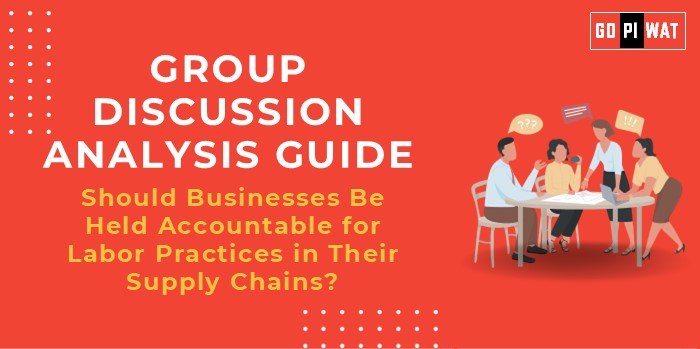📋 Group Discussion (GD) Analysis Guide: Should Businesses Be Held Accountable for Labor Practices in Their Supply Chains?
🌐 Introduction to the Topic
In an increasingly interconnected global economy, businesses often rely on complex supply chains stretching across continents. This raises ethical concerns about labor practices in supplier operations, particularly in developing countries where oversight might be limited. The topic becomes critical as corporate accountability intersects with issues of human rights, corporate social responsibility (CSR), and sustainability.
📊 Quick Facts and Key Statistics
- 🌍 Global Forced Labor: 27.6 million people are in forced labor worldwide (ILO, 2022).
- 📈 Business Responsibility: 75% of consumers globally expect businesses to take a stance on labor rights.
- 🌐 Impact of Globalization: 60% of supply chain operations are located in low- and middle-income countries.
- 💰 CSR Spending in India: ₹25,000 crore allocated for CSR initiatives in 2022, with increasing focus on ethical labor practices.
🤝 Stakeholders and Their Roles
- 🏢 Businesses: Responsible for ensuring ethical labor practices within supply chains through due diligence and audits.
- 🏛️ Governments: Setting legal frameworks, like mandatory disclosure laws and labor regulations.
- 👨👩👧👦 Consumers: Holding companies accountable by preferring ethically produced goods.
- 📢 NGOs and Activists: Monitoring supply chain violations and creating awareness.
- 🌐 Global Organizations: Bodies like the ILO establish standards for fair labor practices.
🏆 Achievements and Challenges
✨ Achievements:
- 🌟 Global Initiatives: Initiatives like the UN Global Compact encourage responsible supply chain management.
- 🏆 Success of Ethical Brands: Brands like Patagonia demonstrate business benefits of fair labor practices.
- 🔗 Supply Chain Transparency: Adoption of blockchain technology (e.g., Walmart).
⚠️ Challenges:
- 📜 Lack of Regulation: Many countries lack stringent laws on supply chain accountability.
- 💸 Cost Pressures: Competitive pricing often leads businesses to compromise on labor standards.
- 🔍 Complex Supply Chains: Multilayered supplier systems make it difficult to trace violations.
🌍 Global Comparisons:
- 🇪🇺 EU Directive: The Corporate Sustainability Due Diligence Directive requires companies to identify and mitigate labor violations.
- 🇧🇩 Rana Plaza Disaster: The 2013 tragedy in Bangladesh pushed companies like H&M and Zara to reform practices.
📚 Case Studies:
- 🍎 Apple’s Supply Chain: Criticized for unethical labor practices in China, Apple introduced labor audits and supplier codes.
- ☕ Fair Trade Certification: Companies like Starbucks have adopted ethical sourcing models.
🗣️ Structured Arguments for Discussion
- ✅ Supporting Stance: “Businesses must be held accountable as they profit from supply chains and have the resources to enforce ethical practices.”
- ❌ Opposing Stance: “Accountability cannot solely rest on businesses, as governments must ensure labor laws are enforced at local levels.”
- ⚖️ Balanced Perspective: “While businesses should be accountable, governments and consumers must share the responsibility to improve supply chain standards.”
💡 Effective Discussion Approaches
📜 Opening Approaches:
- “With 27 million in forced labor globally, businesses must rethink their supply chain ethics.”
- “The Rana Plaza disaster exposed the human cost of unchecked supply chains.”
🔍 Counter-Argument Handling:
- “While cost pressures exist, companies like Patagonia show that ethical supply chains are profitable.”
📈 Strategic Analysis of Strengths and Weaknesses
- 🏅 Strengths: Ethical supply chains enhance brand reputation; align with ESG (Environmental, Social, Governance) trends.
- ⚠️ Weaknesses: Increased compliance costs; difficulty tracing practices in multi-tiered supply chains.
- 💡 Opportunities: Leveraging technology (blockchain, AI) for supply chain transparency; growing consumer demand for ethically sourced goods.
- ⚡ Threats: Loss of competitive pricing due to stricter labor standards; greenwashing concerns (superficial compliance).
🎓 Connecting with B-School Applications
- 📚 Real-World Applications: Ethical supply chain management can form case studies for sustainability, CSR, and operations management courses.
- 💬 Sample Interview Questions:
- “What role should technology play in ensuring ethical supply chains?”
- “How can businesses balance profitability with social responsibility?”
- 🔑 Insights for B-School Students: Understanding ethical supply chains is critical for roles in operations, CSR, and consulting. Ethical leadership drives sustainable business practices and long-term success.


